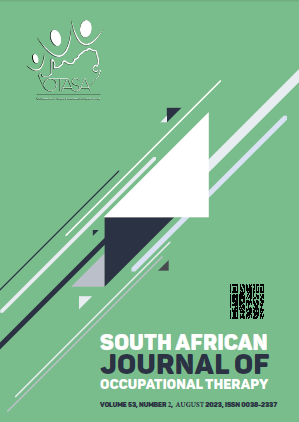Integrated knowledge-translation in occupational therapists working with high-risk infants in South Africa: An explorative qualitative inquiry
DOI:
https://doi.org/10.17159/2310-3833/2023/vol53n2a8Keywords:
Neonatal care, Evidence-based practice, Knowledge utilisation, Early intervention, Neurodevelopmental supportive careAbstract
Background: This qualitative study explored the knowledge to practice gaps of occupational therapists who have a vital role in neuro-developmental supportive care for high-risk infants.
Methods: Via purposive sampling, 17 therapists working in public health in South Africa were recruited to participate in virtual focus groups. Data were thematically analysed using a hybrid approach.
Findings: Five themes emerged, which included (i) occupational therapy and neonatal care in the public health sector, (ii) knowledge acquisition and knowledge synthesis, (iii) knowledge translation and utilisation, (iv) contextual barriers and adaptation and (v) the ideal occupational therapist in the ideal neonatal setting. Facilitators, inhibitors, referrals, and interest in occupational therapy neonatal care were also highlighted .
Conclusions: Knowledge to practice gaps in occupational therapy include insufficient training, a decreased interest in neonatal care, staff shortages, multi-disciplinary team rotations and a reduced understanding of the professional role and scope of occupational therapy. Resources, training, and policy development appear to be necessary to inform a standard of care.
IMPLICATIONS FOR PRACTICE:
The role of the occupational therapist in supporting high risk infants is generally limited and remains somewhat unknown in current South African contexts. It is essential to identify knowledge-to-practice gaps for occupational therapists supporting high-risk infants in the public health sector for successful implementation of neurodevelopmental supportive care. By the exploration of practitioner opinions and insight through appreciating the role of the occupational therapist in managing high risk infants, contextually specific and relevant knowledge translation interventions may be developed and implemented which have implications for evidence-based practice and more successful outcomes in the high-risk infant.
Downloads
References
See PDF for full list of References
Downloads
Published
Issue
Section
License
Copyright (c) 2023 South African Journal of Occupational Therapy

This work is licensed under a Creative Commons Attribution-NonCommercial-NoDerivatives 4.0 International License.
How to Cite
- Abstract 252
- PDF 119




.png)